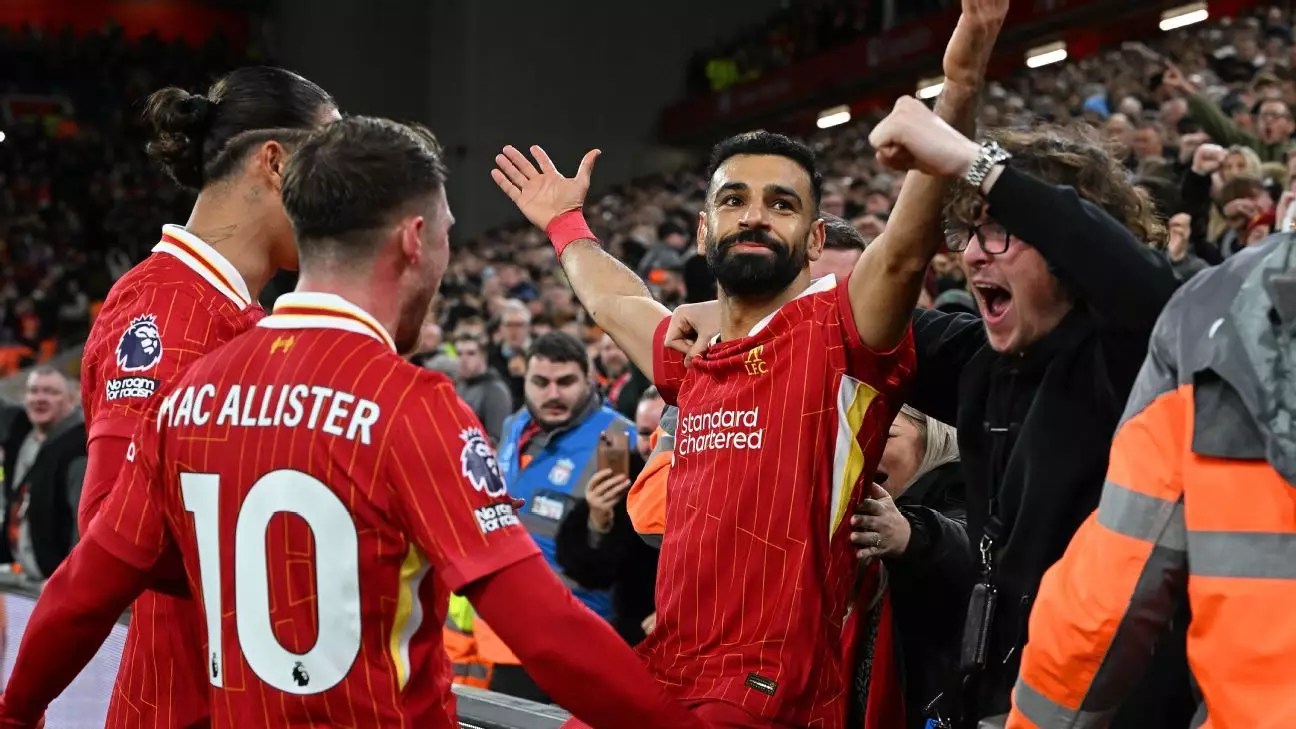Mohamed Salah remains a pivotal figure in the world of football, especially as Liverpool’s star forward. His recent performances have sparked discussions about his future at Anfield, as shown by his notable goal against Manchester City that contributed to a decisive victory. This match served not only as a demonstration of Salah’s relentless talent but also as a platform for speculation regarding his potential moves to other clubs. His remarks following the match hinted at uncertainty about his long-term future, fueling debates among fans and analysts as to whether these comments were merely strategic maneuvering or reflections of genuine dissatisfaction with his current standing at the club.
Salah’s brilliance is well documented; to contextualize his value, he has amassed an impressive record of 64 goals and assists against top-six Premier League teams in 74 matches—a staggering statistic that underscores his consistency at the highest level. Furthermore, his statistics from this season alone — 13 goals and 11 assists in 20 appearances — reinforce the notion that he remains one of football’s elite talents, dismissing earlier notions of decline.
Though rumored interest from Paris Saint-Germain and various Saudi Arabian clubs dominates the headlines, it is critical to recognize Salah’s unwavering commitment to his current club. His statements about Liverpool feeling like home highlight a complex emotional attachment while simultaneously navigating the pressures of professional football, where contracts and negotiations can often overshadow a player’s passion for the game.
Meanwhile, the emergence of Omar Marmoush adds another layer to the narrative of African players in European football. The Eintracht Frankfurt starlet is making significant strides in the Bundesliga, evidenced by his recent two-goal performance against 1. FC Heidenheim. His ability to combine technical prowess with remarkable finishing skills draws undeniable parallels to Salah. Observers can’t help but see echoes of Salah’s early career in Marmoush’s movements and tactical awareness on the pitch.
With 13 goals and seven assists in just 12 Bundesliga appearances this season, Marmoush is not only establishing himself as a key player for Frankfurt but is also attracting attention from some of Europe’s largest clubs. The competitive landscape will surely intensify as clubs begin to vie for his signature, illustrating how quickly fortunes can shift in football. As he continues to hone his craft and gain experience, fans and analysts alike are eager to see if he can maintain his current trajectory and potentially step into the limelight as the next African superstar.
Equally captivating is the case of Nicolas Jackson, who has been making headlines at Chelsea. His recent performances, particularly the goal scored in Chelsea’s recent 3-0 victory against Aston Villa, further solidify his position as a central figure in the club’s attacking lineup. With eight goals in 13 league appearances, Jackson is beginning to garner comparisons to established stars like Salah and Erling Haaland.
Despite starting the season amid scrutiny regarding his technical abilities, Jackson has silenced critics through sheer determination and consistent hustle on the pitch. His evolution from a player needing refinement to a formidable frontman has captured the watchful eye of commentators, including Premier League great Alan Shearer, who praised his relentless approach in front of goal. Such recognition is vital for a player still navigating the challenges of top flight football, and it reinforces the notion that he could become a premier player in the coming years.
The narratives surrounding Salah, Marmoush, and Jackson illuminate a pivotal trend in the footballing landscape: the ascendance of African players in elite European leagues. Each player’s individual story showcases various pathways to success, characterized by their unique experiences, challenges, and achievements. Collectively, they also symbolize the growing impact of African talent within European football.
As clubs increasingly scout and invest in African players, the continued success of these athletes not only enriches their own careers but also contributes to elevating African football on a global stage. The emergence of such diverse talent across prominent European leagues serves as both an inspiration for future generations and a compelling narrative for fans around the world.
The journeys of Salah, Marmoush, and Jackson reflect the dynamic and ever-evolving atmosphere of football, where talent knows no borders and the potential for greatness is abundant. As their stories unfold, it will be intriguing to track their careers and the broader implications for African representation within the sport.


Leave a Reply